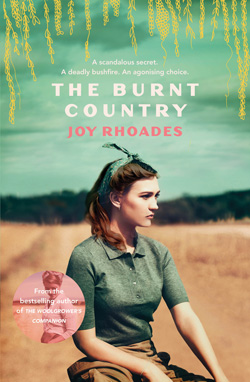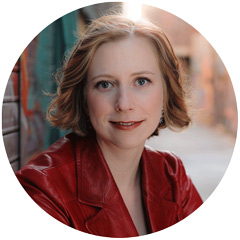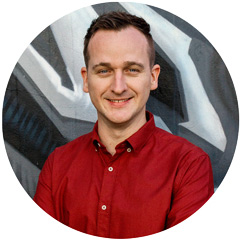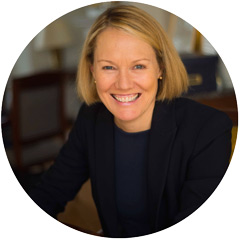Q&A with Joy Rhoades, Laywer and Author
It is hard to find the ‘new normal’ when the world is rapidly changing around us. In the midst of a global pandemic and upheaval that comes with it, creative pursuits can be bogged down by uncertainty, anxiety and isolation. How can one write about the world when it looks so different than it did a few months ago?
In our recent Global Leadership Series webinar Creativity in the time of COVID-19, our expert panel drew on their experiences to discuss how to continue one’s creative journey during times of disruption.
We caught up again with UQ alumnus Joy Rhoades, to answer more of your burning questions about her writing journey during isolation.
When did writing start for you?
I got serious about writing when I moved to New York. My day job was as a lawyer on Wall Street (literally: that office was at 60 Wall Street) but at night, I took classes in creative writing. I half hoped that would put paid to my compulsion to write. But the classes just fed my habit: I wanted to write more and to write well. Then I was accepted into the creative writing program at the New School University, and did my Masters at night. My first book, The Woolgrower’s Companion, is based on my dissertation.
How different is it to write on policy compared to writing for creative purposes? Which do you enjoy more?
It’s like speaking two different languages. To write fiction, you have to be unconstrained, to refuse to care what others will think of your work, or how they’ll judge you. It’s liberating, in a way.
And while it’s freeing for me to write fiction, it’s still rewarding to write policy. Once a policy is done, its done, at least until the law or the business changes. The problem is solved. Your novel is never like that. I want to edit, even when I’m reading aloud at events to promote it!
Do you have any tips for students wanting to become a writer?
Take your craft seriously. It’s not an accident that most best-selling authors are former journalists. They can write.
The other thing I say to my students is keep you day job. And only half in jest. Writing is a hard road, even for successful writers, and writer incomes have fallen (plummeted, actually) in the past ten years. I feel very lucky I can work as a lawyer. It means I can afford to write fiction.
What are your top editing tips?
The writing is easy; it’s the editing which is hard work. So I encourage students to edit a little at first, and then a whole lot. When I start a day’s writing (and I try to write before work, now) I look at what I wrote the day before: read over it, and edit it slightly. That quick review and edit gets my head back into where I was when I left off, but I don’t get bogged down in huge changes and I continue writing. Because the world is full of writers with a perfect first chapter who never wrote a second. Finish your draft, then start editing in earnest.
Do you think books can give people hope? More so than other media forms?
We live in such dark times, anything that brings hope is valuable. More than valuable. And books do that. They require us to create a world from the words on the page. That engagement, that suspension of disbelief, transports the reader, much more so than something which requires less imagination like YouTube or cable TV.
In every one of our lives at the moment, almost anywhere in the world, we’re seeing bravery and loss, despair and sacrifice. Books that show us those same things, yet also show us that this too will pass, are a precious thing. And novels might show us things to a depth and with a complexity that a box set can’t.
Importantly, novels can show us the way forward. Racism, sexism, the environment: I write about all those things in my novels, but underpin the narrative with characters who act, who do something about the problems they see that affect them. Because whether it’s wearing a mask to protect your neighbour or pushing your local council to take environmental action, all change is local. It has to come from the bottom up until those who govern recognise the new norm. And those ‘new’ norms? A thirst for racial and gender equality, sustainability, protection of biodiversity? They’re already here, under the surface, everywhere.
 As COVID-19 has changed so many aspects of life, perhaps permanently, how do you write without framing everything in a post-COVID world?
As COVID-19 has changed so many aspects of life, perhaps permanently, how do you write without framing everything in a post-COVID world?
I’m still processing where we are. My third book, the one that I’m working on now, is set in 1949, so it’s easier to write than something contemporary. But I’m pootling along, writing a bit, working on my podcast Start Write and running writing sessions for the libraries. There’s something very comforting at this time, to be providing a creative outlet for others.
Joy’s latest book, The Burnt Country, a bestseller in its category, was released last year.
Missed the event? Watch the webinar below.
Speakers
 Dr Helen Marshall
Dr Helen Marshall
Dr Helen Marshall is a Senior Lecturer of Creative Writing at the University of Queensland. She has won the World Fantasy Award, the British Fantasy Award and the Shirley Jackson Award for her two collections of short stories. Her debut novel The Migration released last year argued for the need to remain hopeful, even in the worst circumstances. It was one of The Guardian’s top science fiction books of the year and was recently optioned by Clerkenwell Films.

Shannon Molloy
Shannon Molloy is an award-winning journalist and writer whose career spans print, digital and publishing, covering a range of topics from politics to entertainment and social affairs. He is currently a senior reporter at news.com.au. His debut book, Fourteen, was recently released to critical acclaim.

Joy Rhoades
Joy Rhoades is an Australian lawyer and writer living in London. Her first novel for Penguin, The Woolgrower’s Companion, was a debut bestseller in Australia in 2017 and was shortlisted for the McKitterick Prize (UK Society of Authors) and the Historic Writers’ Debut Crown.
Joy studied law at the University of Queensland. While living in New York, she completed a Masters in Creative Writing at the New School University. She now lives in London with her family, and enjoys both the discipline of legal work and the freedom of writing fiction. She teaches creative writing for London libraries and has a podcast, Start Write, on writing craft for beginners. She also tweets on writing and the environment @joyrhoades1.
